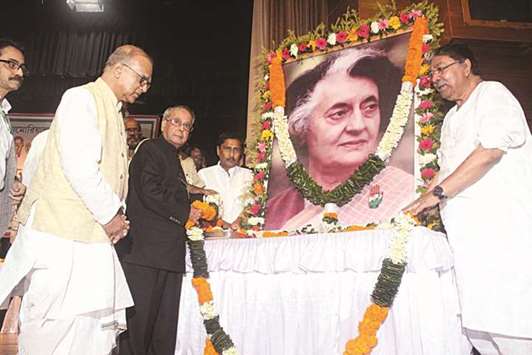In her death, former prime minister Indira Gandhi left a message that “a commitment to the people can never be killed by any power, however strong it may be”, former president Pranab Mukherjee said yesterday.
Mukherjee was speaking at the inaugural function of a photo exhibition on Gandhi on the centenary of her birth anniversary at her memorial here.
Several tough decisions taken by her during her premiership such as nationalisation of banks and not signing the non-proliferation treaty (NPT) have stood the test of time, he said.
“The bank nationalisation decision... was a bold step that resulted in rich dividends for the country,” Mukherjee said.
“The impact of this decision was evident even in the last decade when the Indian banking system stood resilient, even as some of the major European and US banks suffered catastrophic meltdowns after the financial crisis in 2008,” he said.
Gandhi nationalised 14 commercial banks on July 13, 1969 through an ordinance despite resistance from a section of the Congress.
The move, Mukherjee said, was a step towards rebuilding people’s confidence in the Congress’ commitment to socialism.
The veteran Congressman said Gandhi’s contribution to world peace and disarmament was visible in her “steely protests against the flawed NPT”.
“Though she was in agreement with the treaty’s basic objective, she could not agree to two categories of states - one privileged class that possessed nuclear weapons and unrestricted access to nuclear materials for whatever purpose they deemed fit, and a vast number of other countries who would be denied access to the peaceful use of nuclear materials to generate electricity.
“She did not agree to this discrimination and refused to sign the NPT, which is the policy of the nation to date.
“The first nuclear explosion at Pokhran in 1974 brought sanctions against India. Trade restrictions and stoppage of economic assistance did not deter her. The second test conducted by Atal Bihari Vajpayee as prime minister in 1998 vindicated her stand,” Mukherjee said.
He also recalled how Gandhi, despite knowing fully well that Sikhs would never forgive her for Operation Blue Star in their holiest shrine Golden Temple, turned down her advisers’ suggestion to remove Sikh personnel from her security arrangement saying “it would send a wrong message”.
“She told her advisers that she was aware of this feeling amongst the community... But for her, it was not a question of religion, but the fact that in the name of religion, misguided elements were causing great harm to national unity and integrity,” he said.
Congress president Sonia Gandhi said the later prime minister “fought for secularism, against all those forces seeking to divide the Indian people on lines of religion and caste.”
“I have heard Indiraji being referred to as the Iron Lady. But iron was only one of the elements in her character; generosity and humanity were just as prominent traits,” she said about her mother-in-law.
Indira Gandhi was prime minister from January 1966 to March 1977 and again from January 1980 until her assassination on October 31, 1984.

Former president Pranab Mukherjee and Congress leader Somen Mitra pay tribute to late prime minister Indira Gandhi on her birth centenary in Kolkata yesterday.
